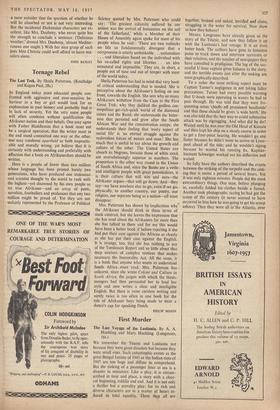Teenage Rebel
The Last Trek. By Sheila Patterson. (Routledge and Kegan Paul, 28s.)
IN England today most educated people con- fronted with aggressive and over-sensitive be- haviour in a boy or girl would look for an explanation in past history and probably find it in lack of security. Yet the very same people will often condemn without qualification the Afrikaner nation and their beliefs. One may agree with Father Huddleston that a book must not be a surgical operation, that the writer must in the end stand committed one way or the other, one may condemn apartheid as both impractic- able and morally wrong, yet believe that it is certainly with understanding and preferably with affection that a book on Afrikanerdom should be written.
Here is a people of fewer than two million whose language has been printed barely two generations, who have produced one statesman and scientist thought by the world to rank with the highest—yet disowned by his own people as no true Afrikaner—and an array of poets, novelists, footballers and professors that any two million might be proud of. Yet they are not unfairly represented by the Professor of Political Science quoted by Mrs. Patterson who could say : 'The greatest calamity suffered by our nation was the arrival of humanism on the soil of the fatherland,' while a Member of their House of Assembly again spoke for most of his people when he said : 'There are two outlooks on life so fundamentally divergent that a compromise is utterly unthinkable .. . nationalism . . . and liberalism based on the individual with his so-called rights and liberties . . . an idea unnatural and impossible.' They are, in short, a people out of tune and out of temper with most of the world today.
Sheila Patterson has had in mind that very book of critical understanding that is needed. She is perceptive about the Afrikaner's feeling on one front, towards the English. She sees why so many Afrikaners withdrew from the Cape in the First Great Trek; why they disliked the godless cos- mopolitan get-rich-quick world of the diamond mines and the Rand; she understands the bitter- ness that persisted and grew after the South: African War and the concentration camps; she understands their feeling that 'every aspect of social life' is 'an eternal struggle against the malevolent forces of nature and man? She has much that is useful to say about the growth and culture of the other. The United States can absorb its Negroes, because those of white stock are overwhelmingly superior in numbers. The proportion is the other way round in the Union of South Africa and, since the Bantu are a• virile and intelligent people with great potentialities, it is their culture that will win and ours—the Afrikaner argues—that will go down. And—they say—we have nowhere else to go; even if we go, physically, to another country, our poetry, our religion, our separate being as a nation—all must disappear.
Mrs. Patterson has shown by implication why the Afrikaner should think in these terms of stark contrast, but she leaves' the impression that she has read about the Afrikaners far more than she has talked to them and for me this would have been a better book if before rejecting it she had put their case against the African as clearly as she has put their case against the English. It is strange, too, that she has nothing to say of the Tomlinson Report and so little about that deep mixture, of complex motives that makes necessary. the Immorality Act. All the same, it is a book that anyone who wants to understand South, Africa -must 'read. Mrs. Patterson has unlearnt, since she wrote Colour and Culture in South Africa, the jargon with which the thesis- mongers had then persuaded her to load her style and now writes a clear and intelligible English. But there is some careless writing and surely twice is too often in one book for the tale of Afrikaner boys being made to wear a dunce's cap for speaking Dutch.
PHILIP MASON


































 Previous page
Previous page